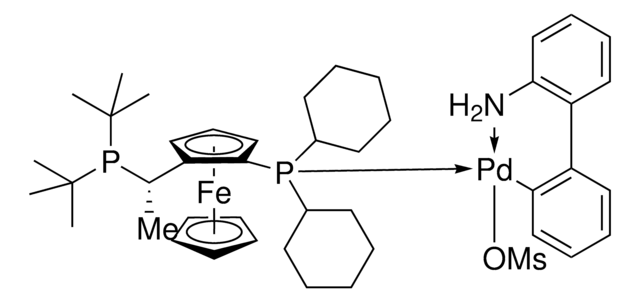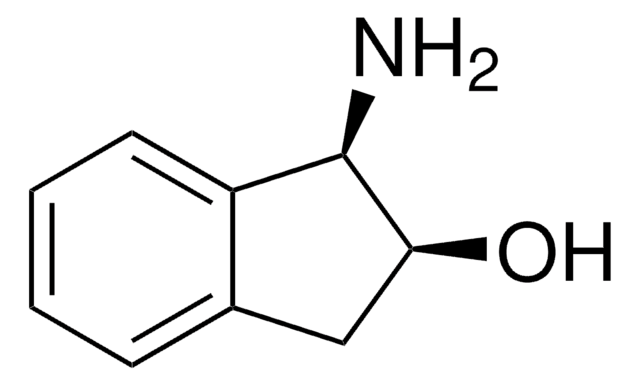804568
(R,S)-Bode Kinetic Resolution Catalyst
Synonym(s):
(4aR,9aS)-6-Bromo-4-hydroxy-4,4a,9,9a-tetrahydroindeno[2,1-b][1,4]oxazin-3(2H)-one
About This Item
Recommended Products
form
solution
Quality Level
storage temp.
15-25°C
SMILES string
O=C(CO1)N(O)[C@@]2([H])[C@]1([H])CC3=CC=C(Br)C=C32
InChI
1S/C11H10BrNO3/c12-7-2-1-6-3-9-11(8(6)4-7)13(15)10(14)5-16-9/h1-2,4,9,11,15H,3,5H2/t9-,11+/m0/s1
InChI key
FQXSUQCCAHKURK-GXSJLCMTSA-N
Application
It can also be employed in the preparation of nonracemic piperidines by kinetic resolution using an α-hydroxy-α′, β-unsaturated ketone in the presence of a pyrrolotriazolium salt.
Signal Word
Warning
Hazard Statements
Precautionary Statements
Hazard Classifications
Acute Tox. 4 Oral
Storage Class Code
11 - Combustible Solids
WGK
WGK 3
Flash Point(F)
Not applicable
Flash Point(C)
Not applicable
Certificates of Analysis (COA)
Search for Certificates of Analysis (COA) by entering the products Lot/Batch Number. Lot and Batch Numbers can be found on a product’s label following the words ‘Lot’ or ‘Batch’.
Already Own This Product?
Find documentation for the products that you have recently purchased in the Document Library.
Related Content
The Bode Group aims to develop new reactions and reagents for the synthesis of complex molecules. The Bode Group has developed N-mesityl-substituted NHCs as organocatalysts for the catalytic generation of reactive species including activated carboxylates, homoenolates, and enolates. These novel catalysts and reactions have made possible a new generation of highly enantioselective annulations from simple starting materials under mild reaction conditions, usually at room temperature and without added reagents. Furthering the goal of designing new reagents to enable the assembly of complex molecules, the Bode group has developed SnAP reagents for the facile, one-pot conversion of aldehydes into N-unprotected, saturated N-heterocycles, including bicyclic and spirocyclic structures. These easy to handle reagents provide a simple and robust alternative to the challenging and restrictive cross-coupling methods for the functionalization of saturated N-heterocycles.
The Bode Group aims to develop new reactions and reagents for the synthesis of complex molecules. The Bode Group has developed N-mesityl-substituted NHCs as organocatalysts for the catalytic generation of reactive species including activated carboxylates, homoenolates, and enolates. These novel catalysts and reactions have made possible a new generation of highly enantioselective annulations from simple starting materials under mild reaction conditions, usually at room temperature and without added reagents. Furthering the goal of designing new reagents to enable the assembly of complex molecules, the Bode group has developed SnAP reagents for the facile, one-pot conversion of aldehydes into N-unprotected, saturated N-heterocycles, including bicyclic and spirocyclic structures. These easy to handle reagents provide a simple and robust alternative to the challenging and restrictive cross-coupling methods for the functionalization of saturated N-heterocycles.
The Bode Group aims to develop new reactions and reagents for the synthesis of complex molecules. The Bode Group has developed N-mesityl-substituted NHCs as organocatalysts for the catalytic generation of reactive species including activated carboxylates, homoenolates, and enolates. These novel catalysts and reactions have made possible a new generation of highly enantioselective annulations from simple starting materials under mild reaction conditions, usually at room temperature and without added reagents. Furthering the goal of designing new reagents to enable the assembly of complex molecules, the Bode group has developed SnAP reagents for the facile, one-pot conversion of aldehydes into N-unprotected, saturated N-heterocycles, including bicyclic and spirocyclic structures. These easy to handle reagents provide a simple and robust alternative to the challenging and restrictive cross-coupling methods for the functionalization of saturated N-heterocycles.
The Bode Group aims to develop new reactions and reagents for the synthesis of complex molecules. The Bode Group has developed N-mesityl-substituted NHCs as organocatalysts for the catalytic generation of reactive species including activated carboxylates, homoenolates, and enolates. These novel catalysts and reactions have made possible a new generation of highly enantioselective annulations from simple starting materials under mild reaction conditions, usually at room temperature and without added reagents. Furthering the goal of designing new reagents to enable the assembly of complex molecules, the Bode group has developed SnAP reagents for the facile, one-pot conversion of aldehydes into N-unprotected, saturated N-heterocycles, including bicyclic and spirocyclic structures. These easy to handle reagents provide a simple and robust alternative to the challenging and restrictive cross-coupling methods for the functionalization of saturated N-heterocycles.
Our team of scientists has experience in all areas of research including Life Science, Material Science, Chemical Synthesis, Chromatography, Analytical and many others.
Contact Technical Service![(5aR,10bS)-5a,10b-Dihydro-2-(2,4,6-trimethylphenyl)-4H,6H-indeno[2,1-b]-1,2,4-triazolo[4,3-d]-1,4-oxazinium chloride monohydrate 93%](/deepweb/assets/sigmaaldrich/product/structures/104/483/183b49bc-426f-411b-8d11-71bbd4b81022/640/183b49bc-426f-411b-8d11-71bbd4b81022.png)
![(R)-1-[(SP)-2-(Diphenylphosphino)ferrocenyl]ethyldicyclohexylphosphine ≥97%](/deepweb/assets/sigmaaldrich/product/structures/245/493/2ae2dd8a-65cc-4aba-9a1f-1292eb1ad8e0/640/2ae2dd8a-65cc-4aba-9a1f-1292eb1ad8e0.png)


![(R)-1-[(SP)-2-(Diphenylphosphino)ferrocenyl]ethyldi-tert-butylphosphine ≥97%](/deepweb/assets/sigmaaldrich/product/structures/168/768/54a48841-6fe6-437a-81af-8c2e54117ef3/640/54a48841-6fe6-437a-81af-8c2e54117ef3.png)
![(R)-3,3′-Bis[3,5-bis(trifluoromethyl)phenyl]-1,1′-binaphthyl-2,2′-diyl hydrogenphosphate 95%](/deepweb/assets/sigmaaldrich/product/structures/270/636/14dc9413-bcb4-478c-8e4d-3605317c13a5/640/14dc9413-bcb4-478c-8e4d-3605317c13a5.png)

![(R)-N-[(1R,2R)-2-(3-(3,5-Bis(trifluoromethyl)phenyl)ureido)cyclohexyl]-tert-butyl-sulfinamide 96%](/deepweb/assets/sigmaaldrich/product/structures/389/070/18847164-c6a7-4b4e-abcb-2dbc22493a2d/640/18847164-c6a7-4b4e-abcb-2dbc22493a2d.png)


